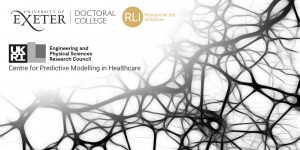
By Kerry Hope, Camille Poignard, Peter Ashwin and Piotr Slowinski
On 30th and 31st March, the EPSRC Centre for Predictive Modelling in Healthcare held a two day workshop entitled ‘Networks Approaches for Healthcare Applications’. Originally, planned to be held at the Living Systems Institute of the University of Exeter, the workshop was instead held virtually due to COVID-19 restrictions. The workshop welcomed a total of 10 speakers, and was organised by Camille Poignard, Kerry Hope, Piotr Slowinski and Peter Ashwin of the University of Exeter. With the ongoing COVID-19 research effort, we were happy to host highly topical talks such as those of Julien Arino (University of Manitoba, Canada) and Jessica Enright (University of Glasgow, UK) that touched on some of the practicalities of interacting with healthcare policymakers and governing bodies.

The workshop brought together researchers from various areas who are interested in using and developing network theoretical tools to tackle healthcare-related problems, with the purpose of building or improving intervention and control strategies for treating human diseases and pathologies, notably in epidemiology, oncology and neurology. For instance, recent advances were presented on how to use networks tools to improve public health strategies focused on preventing and controlling the spread of infectious diseases. To tackle such problems, it is necessary to develop methods to reconstruct the structures of networks from real data, investigate dynamical processes based on these structures, and the dynamics of these structures themselves. Such a “networks” approach is essential to understand pathologies in their entirety.

Organiser, Camille Poignard, research fellow at the Centre for Predictive Modelling in Healthcare explains: “The workshop was due to take place at the University of Exeter but we did not hesitate to turn it into a virtual event. We are very happy with the outcome: going online definitely increased the international impact of our event by enabling live participation from researchers in Japan, Canada and the USA. This stimulated curiosity and interactivity among all of us, as could be seen in the fruitful discussions we had at the end of each talk”.

Camille describes how the workshop went on line: “Under the current circumstances, we were happy that the majority of our presenters kindly accepted to give their talks as scheduled. We also managed to get some additional speakers on very topical issues. Clearly more workshops will take place online in the future, and all of us were definitely excited to interact virtually altogether.”

The talks covered topics including epidemic spreading, brain networks, endocrinology, gene networks, protein interactions networks, temporal networks, time-delay dynamical systems and had good balance of theoretical and data-driven approaches. We welcomed a range of speakers and participants from across the globe including the UK, Ireland, Singapore, Austria, France, Germany, Switzerland, Luxembourg, Slovenia, Columbia, Canada, USA and Japan. This included participants from our fellow EPSRC Centres for Mathematics in Healthcare across the UK. A full list of speakers and program is available at the workshop webpage: http://nethealth2020.weebly.com. The workshop was supported by the EPSRC Centre for Predictive Modelling in Healthcare and through a Research Led Initiative of the University of Exeter Doctoral College.
Feedback from participants included:
“The talks were very informative and the Zoom interface was effective with screen sharing and ability to ask questions when necessary.”
“The scope of speakers was very good – a variety of different background, but working on similar types of applied maths problems.”
We thank the speakers and participants of workshop who made this an extremely worthwhile event, and look forward to cultivating further collaborations. Please follow the CPMH on Twitter to keep up-to-date on our future plans, events and opportunities.